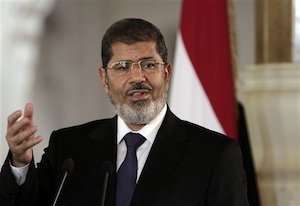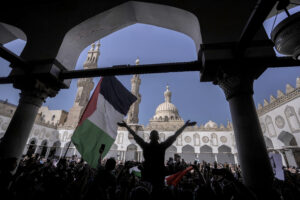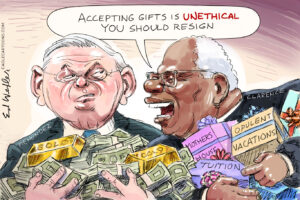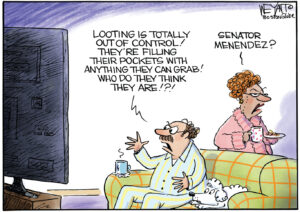Egypt on the Brink
The announcement by the nation’s leftists and secularists that they will not contest this spring’s elections for the lower house of parliament is a needless disaster that could plunge Egypt into years of unrest.The announcement by the nation’s leftists and secularists that they will not contest elections could plunge Egypt into years of unrest.
On Tuesday, a hot air balloon flying over the ancient city of Luxor, Egypt, exploded and plunged 19 foreign passengers to their deaths, an event that will further harm the country’s limping tourist industry. The tragic balloon fail is an apt metaphor for the political process in Egypt, which has been marked by highhanded and arbitrary decisions on the part of elected government officials. President Mohamed Morsi met Tuesday with those few members of the opposition who would sit down with him, an attempt to mollify the guests with respect to the country’s new law governing elections, which, they maintain, disadvantages them. The rest of the opposition says it is withdrawing from parliamentary elections scheduled for April.
Morsi’s decree in November temporarily putting himself above the law, his decision to push through a controversial constitution that lacks consensus support, and his new elections ordinance, have provoked huge demonstrations, strikes and boycotts. This turmoil, in turn, has hurt Egypt’s key tourism industry, reducing proceeds from $12.5 billion a year before the 2011 uprising that toppled President Hosni Mubarak to $10.5 billion a year after. The announcement by the nation’s leftists and secularists that they will not contest this spring’s elections for the lower house of parliament is a disaster that could plunge Egypt into years of unrest.
Morsi is from the Freedom and Justice Party, the civil wing of the Muslim Brotherhood. He has announced parliamentary elections in four rounds beginning in mid-April. The National Salvation Front, a coalition of leftist and liberal parties, has objected that the elections law issued by Egypt’s upper house of parliament gerrymandered the nation’s electoral districts so as to benefit the Muslim Brotherhood. The upper house of parliament has many Brotherhood representatives, and about half its number were appointed by Morsi late last fall.
Gerrymandering and other attempts to influence the outcome of elections are a fact of life in democracies, and do not always succeed. Barack Obama was able to prevail in Florida and Pennsylvania in the 2012 election despite Republican Party ploys such as voter identity laws and reduced poll hours. The National Salvation Front’s conviction that it can deny legitimacy to the government by boycotting the balloting is misplaced. Its leaders, including leftist Hamdeen Sabahi, may believe that they can, by refusing to cooperate, wring concessions from Morsi before the vote. But to go into these elections without a campaign organization is suicide for the left and other secularists.
Egypt has lurched from crisis to crisis in the wake of the Feb. 14, 2011, overthrow of the Mubarak regime. Although the uncompromising and domineering political style of the religious right in Egypt, embodied in the ruling Muslim Brotherhood, bears a good deal of the blame for the country’s deadlock, the faintheartedness of Egypt’s left in the face of the upcoming parliamentary elections is also at fault.
There is no reason to think that leftists and liberals cannot do well in elections. In fall 2011, the Muslim Brotherhood gained about 40 percent of the seats in parliament, and the even more hard-line fundamentalist faction, the Salafis, took 24 percent. But about a third of the seats were won by secular candidates, and many Egyptians who voted for the religious right likely did so because they were convinced it has clean hands and is not corrupt.
In May 2012, I was in Egypt during the first round of the presidential elections, in which secularists took about 60 percent of the total vote. Sabahi received more than a fifth of the votes, benefiting from the support of unions and workers in cities such as Alexandria. Morsi won the second round of the presidential election in June by only 3 percent, even though his opponent was widely disliked as Mubarak’s last prime minister. Given the missteps of the Brotherhood and public disillusionment with its policies, secular candidates could well better their performance this time, if they are willing to walk neighborhoods and campaign vigorously.
The Brotherhood government under Morsi has not placated Egypt’s powerful working class, which has seen its wages decline. The demonstrations that have roiled Port Said, a Suez Canal city of 600,000, for the past month are rooted in part in discontent among longshoremen and other workers. These disgruntled laborers are organized, agitated and disillusioned with the Brotherhood, which tends to favor private business. The workers are therefore a voting constituency in search of a party. If the labor-left politicians stay home, so will the workers, and the Brotherhood will win. The same can be said for other vital constituencies, including students and youth, women and the Coptic Christians (the latter are some 10 percent of the population).
The opposition has shown that it is very good, on occasion, at holding large rallies. The crowds have forced Morsi to back off some of his controversial decrees, but only some of them. Ultimately, demonstrating is not a policymaking tool, certainly not in an environment in which regular elections are being held. The same energy and skills necessary to mobilize people to camp out in tents in city squares must now be turned to getting out the vote for parties and candidates that will take the side of the people, of students, workers, women, minorities and liberal Muslims, in the country’s evolving politics. Throwing in the towel now will simply hand Egypt to the Brotherhood and the Salafis, guaranteeing a continued turn to the right in legislation and ongoing political polarization and instability.
Your support matters…Independent journalism is under threat and overshadowed by heavily funded mainstream media.
You can help level the playing field. Become a member.
Your tax-deductible contribution keeps us digging beneath the headlines to give you thought-provoking, investigative reporting and analysis that unearths what's really happening- without compromise.
Give today to support our courageous, independent journalists.






You need to be a supporter to comment.
There are currently no responses to this article.
Be the first to respond.